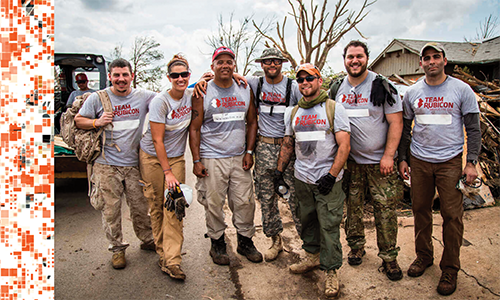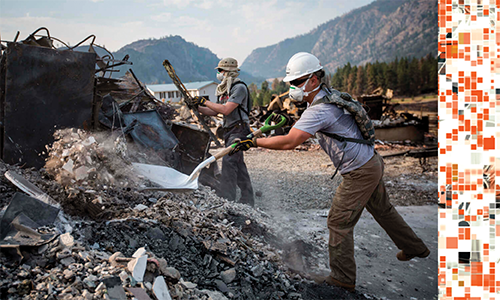IF THERE’S ONE GUY on the planet who knows what leadership is, it’s Jake Wood.
The day three NACS Show keynote speaker doesn’t just talk about leadership—he lives it.
He served four years in an elite Marine Corps scout-sniper unit, leading Marines in combat in Iraq and Afghanistan. He received three meritorious promotions, with one in combat, and is the recipient of the Navy-Marine Commendation Medal for Valor. He co-created Team Rubicon, a nonprofit organization that mobilizes military vets and others to help people globally prepare for, respond to and recover from the world’s greatest natural disasters from earthquakes to hurricanes to typhoons.
When people are loved at work, they feel safe.”
And he’s the author of the memoir “Once A Warrior: How One Veteran Found a New Mission Closer to Home,” an Amazon bestseller and a book that former NBC Nightly News anchor Tom Brokaw called, “The book America needs right now.”
Oh, and that’s not to mention he was also an all-state high school football star and played four years for the University of Wisconsin Badgers.
In his from-the-gut speech to convenience retailers and suppliers at the NACS Show—and in his day-to-day life—Wood lives and breathes this overarching message: Leadership is love. To be a great leader, you must love the people you lead, he says. Demonstrating that love requires three critical things:
- Understanding who they are;
- Understanding where they came from; and
- Understanding where they want to go—and helping them get there.
“When people are loved at work, they feel safe,” he said. And it’s only when workers feel safe and wanted that they can find the inner courage to succeed. “This sense of love is not something you can fake as a leader—it must be genuine.”
MORAL COMPASS
His NACS Show speech and message of hope come at a time when the nation and world are taking baby steps to recover from a life-changing pandemic even as the global economy seems to be spinning south amid forceful recessionary winds. Even then, he says, the nation’s 148,000 c-stores can stand strong and prosper if their leadership not only has vision but also demonstrates trust, integrity and respect for their workers by making decisions through the lens of a moral compass that always puts employees first.
“It takes a lifetime to build a reputation and a moment to lose it,” Wood said, quoting Will Rogers, the famous social commentator and vaudeville performer.
The way Wood sees it, the very best leaders are essentially auditioning and re-auditioning for their jobs by virtue of every action their employees see them take. “You are reapplying for the respect and understanding of those who work for you every moment of every day,” he said.
If you’re a boss who tends to fly off the handle—or one who is willing to make questionable choices that run contrary to the stated goals of the company culture, your employees will likely watch and mimic this same behavior, Wood says. “If you lie, cheat or steal, your employees probably will, too,” he said.
We use the skills the military taught us to help people on the worst days of their lives.”
Wood has built his reputation through incredibly hard work and perseverance. While his motivational speeches help to bring in income, his day job is notably far less cozy or profitable. Since 2010, Team Rubicon, the disaster relief group that he co-founded and now chairs, has responded to nearly 1,000 disasters and humanitarian crises globally and recruited more than 150,000 volunteers to assist. Its on-the-ground assistance has helped to save lives after disasters from the recent Hurricane Ian in Florida to Hurricane Fiona in Puerto Rico to the recent floods in Kentucky to Team Rubicon’s founding moments in 2010 after the tragic 7.0 magnitude earthquake in Haiti.
“We use the skills the military taught us to help people on the worst days of their lives,” he said.
Wood is also the founder and CEO of Groundswell, a software firm that enables companies to make philanthropy an employee benefit. Groundswell launched in 2021 after raising $15 million in venture capital led by Google Ventures.
HANDLING SETBACKS
 A team of Greyshirts (what Team Rubicon calls its volunteers) helps clean up following one of the many natural disasters they encounter every year.
A team of Greyshirts (what Team Rubicon calls its volunteers) helps clean up following one of the many natural disasters they encounter every year.
While great leaders are always striving for the best by creating and sustaining a company culture that encourages it, they simultaneously must be preparing for how to deal with unexpected setbacks that all companies ultimately face. For example, he asks, what if you’re a c-store owner at a location near Lake Powell, the nation’s second-largest reservoir that’s been drying up due to climate change, and you no longer enjoy the vacation traffic that Lake Powell once attracted? You’d need to create a new business plan—perhaps to appeal more to locals. Establishing that vision— and attracting and keeping the right people to embrace that culture—are key, he says.
Planning for the unexpected is no less critical than fostering terrific company culture. That typically requires three steps, he says:
- Make a plan.
- Make a backup plan.
- Make a backup plan for the backup plan.
“Everyone has a plan until they get punched in the face,” he said, quoting former heavyweight champion Mike Tyson, who certainly had to rely on his own series of backup plans after hitting the canvas in the boxing ring.
Great leaders, Wood says, also tend to understand the thinking of Greek philosopher Heraclitus, who believed that for every 100 employees, perhaps 10 of them are so utterly incompetent that they shouldn’t be employed at all; another 80 of them are clock-punchers who are only focused on putting in the minimal amount of work; and nine are fighters who will totally go to the wall for their employers and can think their way through challenges. That leaves just one worker as the so-called warrior—who consistently has the ability to lead the 99 other employees to safety. “His job is to bring it all home,” said Wood. Great leaders have the ability to consistently find and hire the nine fighters—and the one warrior. At the same time, great leaders also have the ability to envision which of their 80 clock-punchers have the unique ability to evolve (through training and proper leadership) into fighters.
You are reapplying for the respect and understanding of those who work for you every moment of every day."
RETAILERS WITH HEART
On more than one occasion while working on a Team Rubicon emergency mission Wood has seen up-close how the very best c-stores respond to local emergencies. He recalls stopping at a convenience store in Western Kentucky during the recent flooding there so his crew could gas up their trucks. A generous c-store owner at one location encouraged the crew to all fill up their thermoses with whatever they wanted to drink—at no charge. The store’s employees and numerous customers were there to observe how the owner reacted in a moment of crisis. “That’s a powerful statement to make,” said Wood. “Simple acts of kindness in a moment of crisis can go a long way toward building trust.”
Wood says that observing the way a c-store’s staff treats customers is the single most important thing in determining his own repeat business. “You need to treat folks coming in with respect and dignity—even if they are homeless or mentally ill,” he said.
At the same time—as his high school football coach used to tell him—Wood says, convenience retailers must be laser-focused on controlling the most basic things that they have the ability to control. Broken lightbulbs need to be replaced. The litter in the parking lot needs to be picked up. Dust on store shelves needs to be cleaned off.
For Wood, such retail basics are the industry’s equivalent of the lesson he learned in the Marines to wake up and immediately make his bed each morning. “This allowed me to exert control in my life, and it set the tone for the rest of the day,” he said. “Let’s learn to focus on the things we own.”
Great leaders, he says, tend to set a course that’s different from everyone else’s—and never waver.
His favorite example of that effective course setting: Southwest Airlines. The airline ultimately opted to create an environment that fully respects its customers—and its employees. That’s why it has no fees for checked bags. That’s why it has no fees for changing flights. That’s why employees are encouraged to build a rapport with customers by cracking jokes over the intercom system.
His take on what Southwest Airlines has accomplished—and what every c-store operator should do—is this simple:
- Start with a vision;
- Keep it simple;
- Make it relatable;
- Be bold;
- Don’t waver.
In the end, he suggests, every convenience retailer should think of his or her organization as a book and their employees as characters in that book. The employees are mostly eager to be characters who have an impact on the plot of that book. It’s up to you to give it to them.
And it’s the same for your customers.
Wood vividly recalls his favorite-ever experience at a neighborhood c-store as a kid
 Team Rubicon is a veteran-led humanitarian and disaster response nonprofit.
Team Rubicon is a veteran-led humanitarian and disaster response nonprofit.
He was just seven or eight years old, and he’d just clubbed his first Little League home run. His proud dad stopped at a c-store on the way home from the game to buy him a Charleston Chew candy bar. After all, that’s what his father’s father had bought for him after his first home run, which was hit many decades earlier. The c-store operator was savvy enough to celebrate along with the family.
Wood had never eaten a Charleston Chew before this moment. That Charleston Chew coincided with one of the most exciting days of his life—and the c-store operator caught on and engaged.
“It was the best candy bar I ever had,” said Wood, reflecting back on one of the most meaningful moments of his childhood.
There’s not one c-store in America that can’t do the same. All it takes, says Wood, is leadership.